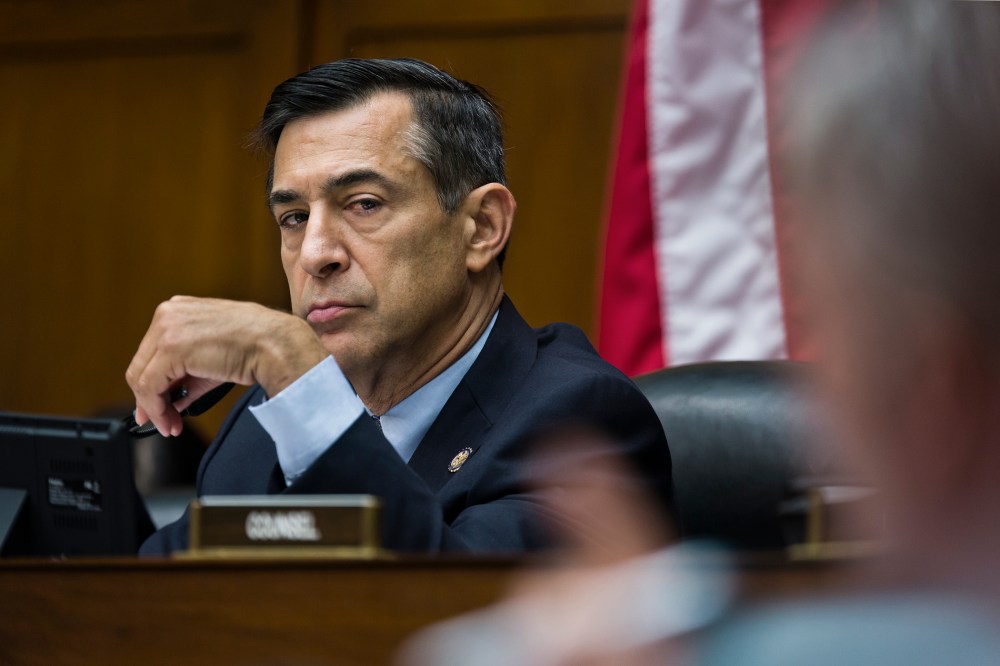Congressional oversight of any administration is important and worthwhile. Indeed, it’s a critical part of the American system to have institutional checks and balances. Lawmakers have a duty to watch the White House and ask tough questions when potential controversies arise.
That said, this was just embarrassing.
Representative Darrell Issa of California, the Republican who is leading one of the investigations into the Internal Revenue Service’s scrutiny of Tea Party groups, accused the I.R.S. commissioner on Monday of lying, an allegation that only deepened the partisan mistrust about the motivations behind the numerous congressional inquiries into the matter.The hearing on Monday night, before the House Oversight Committee, was the second time in four days in which the commissioner, John Koskinen, was called to Capitol Hill to explain what had happened with the emails.
These questions have already been asked and answered, and there’s simply no evidence of wrongdoing. The IRS won’t apologize for the incident because, in this case, agency officials really haven’t done anything wrong — a fact congressional Republicans seem to recognize but choose to ignore.
But what made last night’s hearing an unusually sad display was, well, just about everything.
Consider for example the fact that it was an evening hearing, which is quite unusual on Capitol Hill. Last week, the House Ways and Means Committee and its chairman, Rep. Dave Camp (R-Mich.), demanded the IRS’s John Koskinen testify on the emails. The relevant people checked calendars and picked a date: the hearing would be the morning of Tuesday, June 24 (today).
Issa, seeing the opportunity for a tantrum, literally 10 minutes later, announced he would hold a hearing with Koskinen about the emails on the evening of Monday, June 23. Why? Because Issa wanted to be first. It just made him feel better.
But Koskinen rechecked his schedule and told Ways and Means he had an opening on Friday, June 20, so they held the hearing then — leaving poor Issa to hold a redundant, evening hearing, asking the same questions of the same official about the same story, three days later.
In other words, Issa, still looking for attention and some semblance of a “scandal” that fell apart a year ago this week, is still hunting for his white whale — except he’s not doing it very well.
It’s become increasingly difficult to take the “controversy” seriously because there’s so little meat on the bones. Yes, it’s understandable to raise questions when computers crash and documents are no longer available, but there’s literally nothing to suggest the missing emails would have been remotely interesting. GOP lawmakers are on a fishing expedition, starting with an answer — there must be some wrongdoing, somewhere, from someone — and then working backwards in the hopes of justifying the agreed-upon conclusion.
Consider what we’ve seen for over a year: Republicans demand information, which the administration supplies, and which shows no conspiracy, no cover-up, and no crime. So Republicans demand different information, which the administration also supplies, and which again shows no conspiracy, no cover-up, and no crime.
Which in turn leads Republicans to ask for still more information. In this case, those materials are no longer available, leading the right and some lazy pundits to declare, “A ha!“
This is silly and no way to conduct credible oversight. In my heart of hearts, I strongly suspect Republicans know this, but just don’t care — this is about election-year tactics, mobilizing the GOP’s far-right base, creating fundraising opportunities, and giving conservative media something to talk about.
In reality, though, there’s still nothing here.
Now, John Dickerson argues that the IRS should be better at record-keeping, especially since the tax agency expects much from taxpayers. It’s a fair point. That said, it’s also unrelated to what Republicans care about — the obsession is about politics, not governance — and as Thomas Mann has explained, we’re talking about an agency that “has serious problems, many arising from vast new responsibilities (e.g. the ACA), inadequate resources, and low staff morale in the face of widespread hostility in Congress to the very idea of an Internal Revenue Service.”
If congressional Republicans want to have a mature conversation about how to improve the IRS, that’d be a worthwhile exercise. But by all appearances, the opportunities for mature conversations with GOP lawmakers are far and few between these days.












